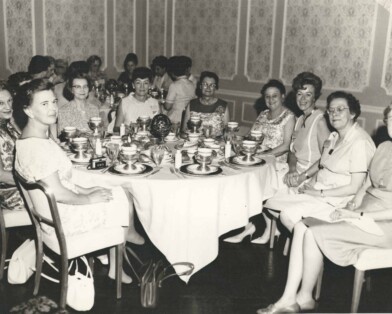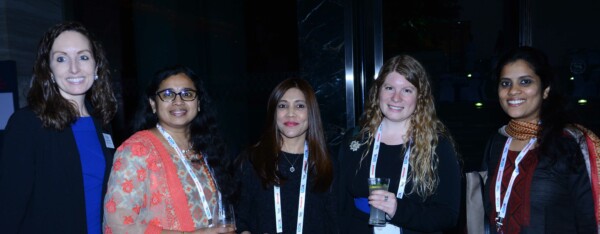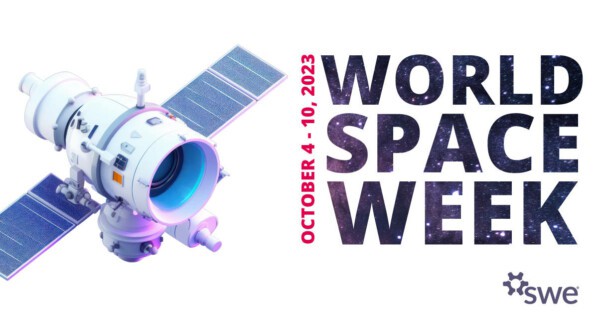Listen to the archived podcast or read the transcript below, then make sure to share it with your colleagues and friends! Be sure to check out our other archives podcasts, as well.

Troy Eller English: Welcome to SWE Stories: Tales from the Archives. I’m Troy Eller English, SWE’s archivist.
Anne Perusek: And I’m Anne Perusek, SWE’s director of editorial and publications. This is the third of a three-part series featuring speakers from a 1968 SWE national convention panel of past Achievement Award recipients. In the earlier two episodes, we featured talks by 1956 Achievement Award recipient Elise Harmon, 1957 recipient Rebecca Sparling, 1961 recipient Laurel van der Wal Roennau, 1963 recipient and Society founding president Beatrice Hicks, and 1964 recipient and computing programming pioneer Grace Murray Hopper.
Eller English: They were all great segments, but I was particularly excited about the talks by Beatrice Hicks and Grace Murray Hopper. Hicks’ strong leadership at the founding of our Society was instrumental to its present success. And Grace Murray Hopper is an absolute legend, and also very, very funny.
Perusek: She was! If you missed the previous two episodes of SWE Stories featuring these speakers from the 1968 panel, we definitely recommend that you go back and listen to them on the Diverse Podcast on your favorite podcast app, or search for “SWE Stories: Tales from the Archives” on alltogether.swe.org. And, as we mentioned in previous episodes, the 1968 panel recording was digitized from 52-year-old reel-to-reel magnetic audiotape, and as such the audio quality is certainly not as crisp as we are used to today. You can follow along in the transcripts for these episodes by searching for “SWE Stories” on alltogether.swe.org.
Eller English: In this episode, we pick up where we left off in the 1968 SWE Achievement Award recipient panel with Drs. Martha Thomas and Marguerite Rogers. Thomas received the Achievement Award in 1965 in recognition of her contributions to chemistry, including the development of natural white phosphor for improved fluorescent lights. During the panel, she explained how the Achievement Award catalyzed her career, and she also spoke quite humorously about her home life as the mother of four young children. I think you’ll enjoy this talk from Dr. Martha Thomas, introduced by 1968 SWE president Alice Morgan Martin.
[Audio excerpt from 1968 SWE National Convention Achievement Award recipient panel]
Alice Morgan Martin: In 1965, the Achievement Award was presented to Dr. Martha Thomas in recognition of her significant contributions to the science of chemistry as an engineer, educator, and administrator, while fulfilling her duties as a wife and mother. At that time, she was section head of phosphor research and development, responsible for all phosphor development work carried on by the lighting products division of Sylvania Electric Products, Inc., a subsidiary of General Telephone & Electronics Corporation. Although educated as a chemist, she has become a proficient engineer and has many patents in the phosphor field. She graduated from Radcliffe College and won her advanced degrees from Boston University.
Martha is married to Dr. George Thomas, who is the director of organic materials at the Army Materials Research Laboratory in Watertown, Massachusetts. They are the proud parents of four daughters. The oldest is eleven, going on twenty-one. (laughter) One is nine, going on ten. The other two are five and four, just going. (laughter)
In 1966, Martha was chosen as a Captain of Achievement by the American Academy of Achievement and received a Golden Plate Award in Dallas. Since then, she has been on the Board of Governors of the Academy. Just prior to this honor, she made a radio tape in connection with the 175th Anniversary of the United States Patent System. It is with great pleasure that I introduce Dr. Martha Thomas. (applause)
Martha Thomas: You know, in spite of Alice’s comments, Los Angeles is going to remember me as that mother with the four children. (laughter) But it’s been fantastic and I think that I can’t forget the experience. My husband never will. (laughter) And the youngsters have had a wonderful time.
Now, when I was asked to speak here, I was asked to talk about things that have happened to me since the award. Alice has mentioned one or two of the highlights, but I’d like to mention, as the others did, I think the highlight is receiving the award. I think because of the award, these other things occurred—at least they were catalyzed. I’ve never had so many newspaper stories—pro and con. I’ve been on radio and TV, and I can’t say it’s my cup of tea, but it’s very interesting. And I have to attribute a good portion of it to the publicity that came from the award in 1965.
I also think I’m a little unique as an award winner because in 1965, three of the four [children] came to Detroit [for the 1965 SWE national convention] to observe mummy’s day of success. The third one got herself “housebroken” two weeks ahead so that she could make the trip because I assured her (laughs) I had enough problems. (laughter) And believe me, a three-year-old youngster realizing that this is one of the necessities of life—I think the award accomplished a great deal. (laughter, applause)
On a little more serious vein—and actually, I wear two distinct hats. On the tour, you’ve seen one hat. I don’t know that you’ll ever see the hat I wear at Sylvania. But as a result of the award, I have a piece of paper now that says I’m an engineer, in spite of my chemistry background. And since that time, I have been given the privilege of setting up now a total of four pilot plants. Now, they’re in not as interesting fields as aerospace, but they’re for the fluorescent lights that still aren’t giving enough light, in our opinion, for television phosphors, and that sort of approach.
And since I learned my engineering on the job, I am now just getting to the point where I can take a concept from the laboratory and realize what it’s going to do when I scale it up for the pilot plant adventure—and it is an adventure. As I left Sylvania last Wednesday, the latest development that’s coming along is requiring that the roof be raised on this multi-million dollar building that Sylvania’s very proud of. And I’ve been dealing with architects and so forth so that this new development won’t affect the outside appearance of the building. So, I’ve learned an awful lot in engineering prior to the award, but now that they’ve decided that I’m really an engineer, I’ve certainly learned it since then.
I think the other thing the award has done for me, is to increase my sense of responsibility. You don’t receive an award from people that you’ve known, and who are in your field, without realizing that you’ve got something pretty big to live up to. And this is awfully hard for me because, you know, (laughs) I tend to be sort of an extrovert – responsibilities, yes, I have, but when I get an award that makes it real rough. So you didn’t do me any favors by giving it to me (laughter), but I’m so glad that you did.
Since 1965, Sylvania has gone into developing a lighting center. I think General Electric has one at Nela Park. And as you all know in the industry, competitive companies always sort of eventually come to the same conclusion. And one side story: Once we moved into the Lighting Center, we became more or less like goldfish in a bowl, because you don’t have a center such as this without the president thinking, Well, now, I’ve got to show our prospective clients that we do have scientists working, et cetera, et cetera. So, there are tours that go around once a day, once every two days. And I sit in my office, and if you want to hear some descriptions of first, what I’m doing, and second, what I am, you should sit in that office. (laughter) At one point, I became the all-time woman engineer of the world. And if the moon were included, I’m sure the tour guide would have made me the—. (laughter) But with all this, we’re still progressing.
I think that perhaps the nicest award, but not certainly as meaningful as the Society of Women Engineers Award—the nicest award I received occurred the year following all this clamor. And we have a Christmas party—my group has a Christmas party. And as you know, there are some joke gifts to, you know, grab—you have to do something at a Christmas party. So, one of the young engineers came up with the idea of having sort of a Nobel Prize representation or put on Nobel Prizes for the Lighting Center. This was all unbeknownst to me, and I received this award.
Now those of you that work with men, I think you’ll understand why this hit me the way it did. It said, “Outstanding Scientist Award, presented to that woman among us who has made the year’s most significant contribution to the field of lighting science, maintaining her sanity,”—well, that was very simple if you’ve seen my home life (laughter)—“and composure while functioning as a scientist, wife, mother, teacher, soother if ills, counselor to her subordinates, defender of the truth, et cetera, et cetera, surely is enough to put her in the midst of the immortals. Rewarded for these very qualities, we honor her tonight on past occasions too numerous to mention. It is with great pride that we present this modest award.” And it turned out to be the Platinum Plate Award, and it was a pie plate (laughter) with a little green bow. Well, that just sort of—I figured that things were going—as an operational engineer, I think it’s very difficult for a woman to try to keep everything balanced and even without men saying, “Oh, that woman.” Now, I’m sure they say it about me, but at least at Christmastime, they have the spirit.
But one other thing that happened to me—and this was just this last summer—as I got the award, and all of a sudden the company decides you must go up further in management. So, the big problem with this is that as you go up further in management, the paperwork goes up exponentially. And I don’t like paperwork. I like engineering. And I think that probably (laughs) this was felt by the corporation, and I received notification that I was to attend the course for management of research and development at MIT last summer. And I went there, and by golly it was another first. I was the first woman to go there. Now, this is again the luck of the Irish. There was a woman due the previous year, and there was an airplane strike and she couldn’t make it. (laughter)
So, we get along beautifully at this course, and I came back. And I felt sure that the company thought I was going to now settle in and get some of this paperwork moving off my desk, instead of stacking it in files. It’s amazing, no ones after those pages in the file. You can leave them there for years! (laughter) Nothing! But in the order of cleanliness, maybe they thought I’d clean out the section, but I didn’t. Instead, I had learned one or two concepts, and I bring one of them up now. And that’s the communications problem.
One of the things I learned at this course was that, although everyone likes to get a small office where he can think, in many surveys that were made by the Sloan School, they found that the fewer people in the office and the more isolated the office, productivity went down. It was a very interesting concept because I had always wanted an office of my own, you know, instead of sharing. So, I came back, and when we moved into the Lighting Center we all had our offices—twelve by twelve cinderblock, you know, real ideal for thinking. (laughs) When I came back from the course, as usual, Sylvania couldn’t predict what a woman would do. I immediately tore down the four walls (laughs) so that now we have three offices that are communicating.
One more aside on this communications problem, which I think is a very real problem among everyone today. I think you’ve met the four girls, off and on, over the last three days. We were driving down to the Cape, and they were all stashed in the station wagon, and they were behaving not in the manner that they’ve been behaving these three days. We had at least two bloody noses. (laughter) People weren’t talking to each other. And after all, when you think of George’s role in this all-feminine household—I mean, he had just really had a rough week (inaudible). It was very difficult; you could see it was trying on him. We get to the halfway point and there’s a Howard Johnson’s. And so, there was dead silence and the oldest one said, “Daddy, can we stop at Howard Johnson’s tonight?” And their father thought a minute, and he said, “Do you think your behavior today warrants such a consideration?” There was dead silence, dead silence. (laughs) And the second one, who calls a spade a spade, said to me in a very low voice, “Mummy, does that mean yes or no?” (laughter)
Well, I don’t know that I said what I was supposed to say up here, but all I can say is that the Society of Women Engineers Award has been the highpoint of my career. It hasn’t done anything but makes the world go faster, but I’m still not at the point where I want to say, “Please stop the world and let me get off,” because I love every minute of it. Thank you. (applause)
Martin: Thank you, Martha.
[End audio excerpt]
Eller English: Well that was fun. As a mother, I particularly appreciated Dr. Thomas suggesting that the largest benefit of the Achievement Award was that it induced her 3-year-old to successfully potty train—or become housebroken, as she put it—in order to attend the 1965 SWE convention with her family. But, on a more serious note, I also recognize her appreciation and satisfaction when her male colleagues gave her a scientist of the year award. I imagine that had to be very meaningful given the environment for women engineers in 1965, and particularly working mothers.
Perusek: Absolutely. Wrapping up the 1968 panel was Dr. Marguerite Rogers, who received the SWE Achievement Award in 1967 for advances in the field of tactical weapons. She is credited with being instrumental in changing U.S. Navy emphasis on nuclear weapons to improved conventional weapons. She shared observations on moving from academia to industry, the importance of technical communication, and the importance of receiving the Achievement Award in lending her, “a luster of respectability.” She was introduced by 1968 SWE president Alice Morgan Martin, who also chastised Rogers for not wearing the Achievement Award pin, which she had received just one year prior.
[Audio excerpt from 1968 SWE National Convention Achievement Award recipient panel]
Martin: Last, but by certainly no means least, is the recipient of the 1967 Achievement Award, a bubbly little gal by the name of Dr. Marguerite Rogers. Her name was selected in recognition of her outstanding contributions to the field of air-delivered tactical weapons. Peggy Rogers is head of the Air to Surface Weapons Division of the United States Naval Ordinance Test Station at China Lake, California. Born in Mexico, she received her M.A. and Ph.D. degrees in physics from Rice Institute. She has made many contributions to ballistics and fire control analysis. Even while teaching physics and head of the science division at Columbia College in South Carolina, she continued her work in weapons research. She has received many honors.
Peggy was married to Fred Cary(???) Rogers, Jr. and is the mother of three children —
Marguerite Rogers: No, it’s five.
Martin: Five? Sorry! (laughter) She is active in church work, is past president of the Women’s Guild, is active in 4H activities, helped found the Ridgecrest Chapter, and is now an advisor to the group.
I must say, she has one very bad habit. You have noticed that the ladies up here today are wearing special pins. That means they are award winners. She just received hers last year, and she came up without it. (laughter) So, it became necessary for the vice president to present her another one. Now with your pin, (laughter) it is with great pleasure that I introduce to you, Dr. Marguerite Rogers. (laughter, applause)
Rogers: I come to you covered with shame. (laughter) I left that pinout on my dresser so that I knew I wouldn’t forget it. And so, I whizzed off last evening—of course, I was late getting home—and I whizzed off and left it there. Last night when I thought of it, I almost phoned one of my sons to come driving down here with it. But I have him under fairly good control, but I don’t have him under quite such good control as that. So, I didn’t. Forgive me. I’ll never do that again. (laughter)
I have nothing very formal to say. I do have some observations that I would like to make. I think many of the things that have been said this morning are so universally true, that the other girls have stolen my thunder. But they stole it and said it so much better than I would have, that I am delighted to have listened to them say it. See, I never listen to myself. That’s the reason I can’t use the Dictaphone, I don’t know what I’ve said. (laughter) As a result, I always have to write everything down, and before I can remember what it was—even a pin, (laughs) bringing a pin.
I started my career as a nuclear physicist. That was an ivory tower-type of existence, an academic atmosphere. I was convinced that truth, with a capital T, would always triumph, and generally and usually they’d give it about ten minutes. (laughter) And experts were always listened to because they knew the right answer. It has taken me some years to discover that people are listened to because people think you have the right answer, and not because you do have the right answer. This is a very important distinction that I think that several of the other ladies have commented on today.
The communications problem is the thing that is going to make or break us in our society today. We live in an era in which decisions are made by people who could not possibly be expected to have technical knowledge. And these decisions are made on the basis of communication with the technical people. Now then, how are we going to communicate? Are we going to be convincing and make them understand that we really know what we’re talking about? Or are we going to be so modest, possibly—now that doesn’t affect me too badly, (laughs) not one of my afflictions—but are we going to be so lacking in forcefulness and cogent thought and convincing ways that we will not be listened to? This is the problem.
And now then, this brings me to a contribution that I think the Society of Women Engineers makes that we sometimes don’t realize. I know that receiving the Achievement Award has been a very important item to me—not only personally, because I was tremendously flattered and thrilled to get it, not only because I enjoyed meeting all of you people—but it gives one a backing. Being a part of this group gives one a backing that is convincing and must not be overlooked.
Of course, one of these curses of my life has been that since so much of my life has been spent in doing analysis for the navy, people have always considered me an ivory tower mathematician, who would be too impractical to know a nut from a bolt. Now, since I am an engineer by fiat, (laughter) I gained a luster of practicality and forthright youthfulness (laughter) that I never had before. This is, however, something that—the moral support that we give each other in an important field should not to be overlooked as an exceedingly important aspect of the Society of Women Engineers. And I feel very proud to have been an Achievement Award winner, and I have found that it carries a lot of weight among my colleagues and the people that I deal with.
Now then, admittedly, I have spent a good part of my life in a very grungy, dull field—namely, plain old conventional weapons. Conventional weapons are not those that are not unconventional, but more weapons that are old-fashioned. We haven’t actually gone back to crossbows quite yet, but we are—thank Heavens, due to the efforts of some of our more romantically-inclined friends, who have built nuclear weapons as a deterrent—we have avoided a nuclear conflict. For that, we can only be profoundly thankful. Undoubtedly, without the stockpile of nuclear capability, we would very likely to have, by now, been involved in such a thing.
But the kind of work that I do is just plain, old, iron bomb-type stuff, you know. So, it means that there’s nothing very thrilling about it, and that’s always the first thing in the budget cuts. (laughter) The fact that we’re using these things in all these little police actions that we do, and have been doing for the past twenty-odd years—the fact we’re using these things and they seem to be, I hope, the only thing we will use, doesn’t seem to enter into the budget cut people. It would easily be able to take some of their thrilling advancements and save $100 million in one stroke of the pen, but instead of which they take $100K here and $500K there, out of the hides of the every day practical bombs, and fuses, and aircraft racks, and ordinary things of that sort.
We discuss of the glorious era in military science and warfare when everything is unmanned. Well, are we going to send a guided missile that costs $500,000 over half of the hemisphere in order to knock down somebody’s outhouse? (laughter) That’s not cost-effective. It just isn’t, you know. (laughter) So, some of us are still trying to be the voice in the wilderness and say, “If knocking down outhouses is what the military must do, then let’s have a weapon that will do it as cheaply as possible, and as neatly as possible.” (laughter) So, I find myself now labeled as a Jeremiah.
My work in the navy, it seems to me, to be largely one of explaining to the powers that be why the latest tremendous missile idea really doesn’t fit into the need. The need is to knock down the privy, so the need should have the weapon tailored to it. And it is amazing how frequently we don’t think in terms of whether something is going to do the job that’s needed. As soon as we see that we have a technological advance, wow, we can go out there and do all this stuff, and we can have mid-course and inertial guidance, and we can have terminal holding, and we can do all this wonderful stuff. And so then, the planners say, “Well, this is all we need. Let’s just throw out all our bombs, let’s throw away guns, let’s throw away anything that’s mundane like that. Let’s go in for a missile era.” Well, you need all of them, but I find a great deal of my time is spent in going back and arguing why we need to keep some of the humdrum, mundane things going.
So, communication, I have come to the conclusion, is most important thing that I have to do. And I believe that this is likely to be the case with many people. The farther along you go in life, and the more you work on these things, the more you find that convincing other people is the most important thing, rather than the actual technical advances that we might make.
In any case, that seems to be the thing that we are doing. I feel that if I had the time—and I admit that I don’t—but if I had the time, I believe I could write a proposed technical approach, a technical development plan, an advanced development objective, the entire kit and caboodle of navy documentation, and I think that I could go and sell a “degravitator.” (laughter) I’m working on this. I just haven’t really worked out the details. The technical side is of very little importance because on most of these advanced development objectives, proposed technical approaches, and the technical development plans, you don’t really need to say how you’re going to do it. You just have to give all this guff in the background about how badly you need it. (laughter) And our all weapons planners in Washington are more concerned with that, than whether you can do it or not. (laughter) And if you wait, each one of them is much more inclined to feel that, this will be our technological breakthrough that will be made on his watch, by golly. And then, of course, maybe he’ll be gone when it flops. (laughter) Well now, I think, though, I can stretch it out for maybe ten years (laughter) before it would be discovered that it was a flop. (laughter) And that is the point that I want to make.
Somehow or other, we must bend our efforts to evaluation. What is feasible and what isn’t feasible? Everybody today lives in a state of credulity that makes the rip-snorting days of the exploration of the Western Hemisphere absolutely as naught. It’s hard to believe that people could believe as much as they believe now. Come back and tell them about unicorns? Why shucks, we could try to sell them “degravitators” instead. And this is a very grave danger. So much of my time is spent in trying to debunk things, being a Jeremiah. Just call me Jeremiah.
The necessity for communications, for valid—an evaluation that will hold water, that will be convincing, and that people can understand. And I don’t mean to imply that admirals can’t understand. I mean they understand a lot of things I don’t know about, but when it comes to some of the technical things, they couldn’t possibly do it. Neither can any other governmental official, or industrial official, who is in a position so high that he has to make many decisions. He can’t possibly know all the little things. Therefore, we must take it as our responsibility to try to give a reasonable and valid representation of what the truth is, of what really can and cannot be done.
In the Achievement Award, I had the feeling that I had been selected by a group of my peers who were competent to select me. It therefore gave me a sense of capability and a feeling of stature that I think cannot be underestimated. For me, it was a tremendous lift to have that feeling, because I think all of us sometimes wonder if what we’re doing is really worthwhile. Is it really valid? And when I was selected as this, I had the feeling it was a credential. It was a vouching to myself, as well as the rest of the world. And I found that was a tremendous experience to me.
I feel that the work that all of us are doing, in all the aspects of engineering, will have a great deal of impact on the decisions that have to be made in this country. And I think that we women should realize that we’r5e very fortunate to belong, in engineering, to a minority group—the women engineers. As such, you have difficulties to overcome, and I admit we all do, but at the same time we’re listened to in a way that is very difficult for men to achieve, simply because they are lost in the large crowd. And we’re kind of singled out. People seem to remember us. (laughter) For that reason, I feel that all of us have a responsibility and a privilege that we should not let—let’s not look at the bad side of having to fight for recognition as a woman engineer. We actually—I don’t ask really for equality. I believe I like the privilege we have. And we do. It is a definite, existing privilege, and I find that that is a very useful commodity as acting—even though I’m not an engineer, at least acting like an engineer. Thank you. (applause)
[End audio excerpt]
Perusek: That concludes the 1968 SWE national convention panel of past Achievement Award recipients. It’s just a wonderful resource to have in SWE’s archives.
Eller English: Absolutely. This panel not only provided more information about the careers of these estimable women engineers but it also really gives you a sense of their characters and who they were as people.
Perusek: We hope you enjoyed these talks as much as we did. You can find the transcript for all three episodes in this series of SWE Stories: Tales from the Archives on alltogether.swe.org. On behalf of Troy and everyone else at SWE, thanks for listening.
Related Content:
- SWE Stories: Tale From the Archives–Early Achievement Award Recipients Offer Advice
- SWE Stories: Tales from the Archives- Early Achievement Award Recipients Offer Advice Pt.2
- Podcast: Celebrating Black History Month with Past SWE President, Sherita Ceaser
Author
-

SWE Blog provides up-to-date information and news about the Society and how our members are making a difference every day. You’ll find stories about SWE members, engineering, technology, and other STEM-related topics.





